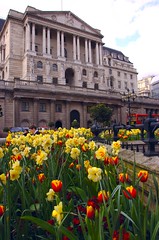Are we running out of money or is this crisis “totally different” to the 1976 IMF bail out
Friday, January 23rd, 2009
Image via Wikipedia
In a speech to the Demos think-tank in London yesterday David Cameron suggested that the UK will have to go begging to the IMF because of Gordon Brown‘s borrowing. “If we continue on Labour’s path of fiscal irresponsibility, at some point – and it could be very soon – the money will simply run out.”
Gordon Brown countered on BBC Radio 4′s Today programme this morning that the current crisis was “totally different” to anything seen before, because it was not driven by high inflation and wages.
So, who to believe?
As I said in my previous post at the beginning of the week, the danger is in the ballooning government debt and the eventual risk that the UK can not raise adequate additional funds in the bond market as international markets loose faith in sterling.
The UK may have a much lower national debt as a % of GDP than many other countries, however, the figures exclude the liabilities relating to the government bank guarantees and the fact that the government has effectively stated that it will not let any of the banks go bust. Their liabilities are therefore effectively the government’s liabilities. Much of UK bank debt is international. The falling pound therefore exacerbate the situation.
Gordon Brown says that the situation is very different to 1976 – we are not facing a scenario where high inflation and rising wages cripple the economy. Does that mean everything is OK then?
There is more than one way to run out of money. Having a banking crisis at a time when government finances are already stretched, committing to bail out the banks and losing the confidence of the international financial community is surely another way of ending up at the door of the IMF.
![Reblog this post [with Zemanta]](http://img.zemanta.com/reblog_e.png?x-id=9739a915-774b-4d5b-afa7-9a5f75da8e92)

![Reblog this post [with Zemanta]](http://img.zemanta.com/reblog_e.png?x-id=5a6bb76e-4d8f-428c-bcc8-60d61e1a5d0e)